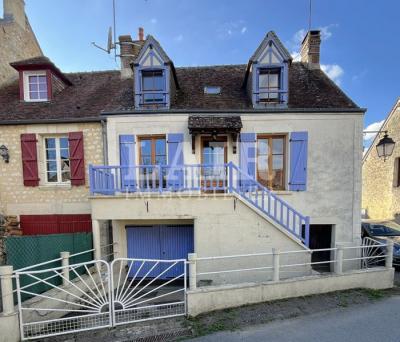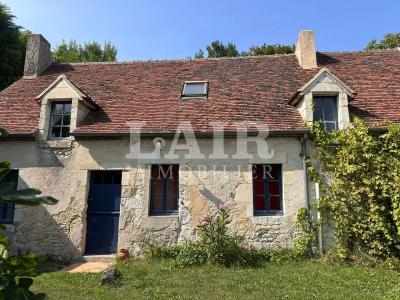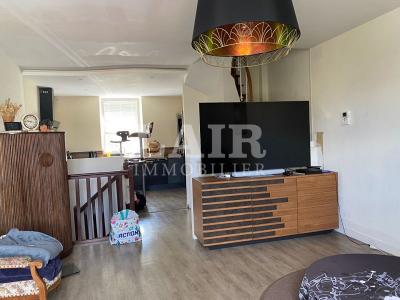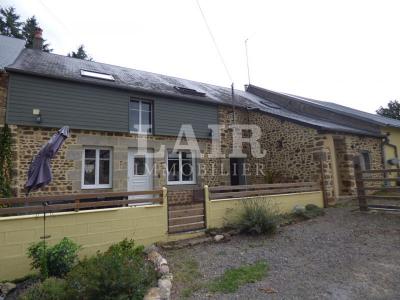Club Clé France: Legal Guide to Selling French Property

We are proud to work in partnership with Ashton KCJ - Legal services. If we think our clients need further legal advice or have a specific legal question that needs solicitor involvement when buying or selling a property in France we can recommend...
Matthew Cameron and his team for expert advice.
Original article supplied by Ashton KCJ - Legal Services.
Introduction:
Even if you are only now purchasing your property in France, it is prudent to contemplate the procedures on a sale as some points will be useful to bear in mind if you ever do need to sell your property.
It is of course advisable to retain the services of a solicitor in the United Kingdom to advise on the implications of the sale. As well as this a French notaire must be instructed, as only a French notaire practising in France can draw up the deed (acte de vente), which formally transfers legal ownership of your property to your buyer.
In general, the buyer pays the notaire’s fees on a sale and purchase transaction, although there are certain disbursements and taxes that the seller may have to bear. You can choose a notaire although your buyer is entitled to appoint his own notaire and the two notaires will then share the statutory fee.
Marketing the property:
There are increasing numbers of direct marketing opportunities, through property journals, the Press, exhibitions and the internet – Clé France is dedicated to all French property matters and have a high success rate of Selling French Property to the international market.
You can also of course use an independant estate agency. Many notaires are able to market and sell your property.
A reputable Agent and all main Agents in the Clé France network will hold a licence (carte professionnelle). The licence will only be granted if the 'préfet' is satisfied the Agent has the requisite skill; has negligence insurance; a bond to protect clients’ money; and meets other certain standards. French estate agents have to display at their premises, where it can be easily read, a notice showing the number of the licence, their name and address – trading name and registered office if a company – the amount of the bond and by whom it is granted, and details of their bankers.
French Agents usually charge commission on a percentage basis – usually between 4% and 8% of the sale price – as agreed in a mandat (written authority) signed and dated by you and usually expressed to be either 'TVA comprise' or 'TTC' (inclusive of French VAT at 19.6%) or exclusive of TVA (‘hors taxe’ or ‘HT’). The 'mandat' should specify whether the commission is payable by you, your buyer or split.
The mandat may grant the Agent the exclusive right (mandat exclusif) to sell the property. In which case, you will be liable to pay the agreed commission even if you sell your property without the Agent’s help, whether directly or through another agent. The 'mandat' should specify the minimum acceptable sale price and the commission.
You should ensure the mandat does not include a power for the Agent to sign a contract on your behalf at that price. It would normally be expressed to be valid for one year, but if you do not strictly comply with all specified cancellation provisions, the mandat may automatically be renewed. Most mandats contain a provision permitting termination after the first 3 months. We would be happy to check through this document prior to your execution of it.
The sale price must be expressed and paid to the notaire in Euros. It is impossible to obtain any firm assurance of the time it will take for you to receive your sale proceeds – which in France do not earn you interest – from your notaire. In some cases, you may not receive all your sale proceeds for a long period following completion; this would generally depend upon taxation, and for this you should ensure that all capital gains tax issues are addressed well in advance of the actual sale.
If your buyer is UK domiciled, it may be possible – subject to payment of fees, taxes, commissions, mortgages and other matters – to avoid these problems and expenses by expressing the sale price to be the Sterling equivalent of the Euro price.
With the consent of your notaire, solicitors can then receive the purchase monies in Sterling from your buyer or his solicitors. It is always preferable where you are selling to a UK buyer that your buyer instructs his own solicitors.
In any event, if you instruct us in the sale we will not be able to give your buyer any advice due to the solicitors’ rules on conflict of interests. However, this option can be a cause for concern – there can be problems if, for example there are fluctuations in exchange rates, and the actual point of agreement of an exchange rate needs to be clarified carefully.
Your obligations as a seller:
The French Code Civil deals at length with the sale of goods and property. As a seller you have three main obligations. First, a duty of care to deliver what has been agreed to be sold; secondly to ensure that the buyer enjoys quiet possession free from any claims by third parties; and, thirdly, a liability in respect of undisclosed defects.
You must ensure that your property will correspond to its description and other details specified in the sale contract. You must attend the notaire’s office to sign the acte de vente, or at least complete a power of attorney (procuration) to authorise someone to attend on your behalf.
If your property is under construction, you must hand over the planning permission (permis de construire) and other relevant planning documentation. It is not possible for a 'permis' to be sold as such; it is an incidental addition to the sale of a plot of land or a partly built house; however it is for the buyer to have this transferred into his name following completion.
You must be able to ensure that all registered charges are cancelled by producing vacating receipts and certificates of cancellation. If the sale contract is silent, the French courts will imply a duty of care on you to deal with this, and will permit a buyer who discovers charges on your property to refuse to hand over the purchase price until you have corrected the situation.
You have a duty to inform your buyer about your property, about easements and any charges affecting it and you must produce evidence of a thirty-year title.
You must be able to ensure freedom from eviction, roughly the right for peaceful possession free from any claim by any third party.
This arises from Article 1626 of the Code Civil under which you guarantee your buyer’s freedom from eviction and from charges affecting your property not previously disclosed at the time of sale.
This guarantee relates both to interference with one’s rights in connection both with fact (troubles de fait) as well as law (troubles de droit).
Examples of troubles de fait are where a seller, who retained adjoining land, built too high a wall and deprived the buyer’s property of direct sunlight; or who diverted a stream which watered the buyer’s land. It may be summarised as action by the seller which abnormally affects the use of property bought by the buyer. Troubles de droit could include undisclosed rights of preemption affecting the property sold. Third party actions include claims by mortgagees or others who believe that they have an interest in your property.
Undisclosed defects:
Article 1642 of the Code Civil states that you are not liable for apparent defects, which your buyer could discover for himself.
Article 1641 says that you are liable for latent defects (vices cachés) which render your property unfit for their intended use or which so substantially diminish such use that your buyer would not have bought your property, or would have paid a lower price, had he known of them.
The sale process:
There are two main legal stages involved in your sale, the first contract and the actual transfer of title, which takes place on signature of the Acte de Vente.
The first stage is signature of the sale agreement. This is normally signed at an earlier stage than is common in England. The agreement will usually be conditional on matters such as the receipt by your buyer of a mortgage offer in a specified amount, investigation of title by the notaire, and other pre-completion searches and checks.
There are two main forms of contract. The more common is a 'compromis de vente' which is an agreement signed by both parties. Instead, you may grant your buyer a unilateral right or option to purchase (promesse de vente) for a maximum duration of 6 months.
This agreement binds you but leaves your buyer the option whether to proceed with the purchase and is subject to certain additional formalities such as registration. During the option period the seller is prevented from attempting to sell or lease to another party hence the necessity for registration. If the buyer decides not to proceed, the contract is cancelled but you can keep the deposit.
In some areas, such as Paris, the initial contract is often referred to as a 'promesse de vente', yet it is signed by both parties and in general simply reflects the terms of a 'compromis de vente'. Agents in various areas will tend to use different terms for this initial contract, all of which may appear confusing; it is wise, therefore, to ask us to verify the draft paperwork before completion.
The contract should deal with apparent defects and may make the sale conditional on a survey, but unless the contract expressly states otherwise, you give a 30 year implied warranty that your property is free from latent defects, even if you are not aware of them.
French estate agents may invite you to sign a standard form contract. It is important not to sign anything without legal advice. The estate agent cannot properly prepare a sale contract without sight of your registered title deed showing the correct legal description of your property.
You should ensure that the contract is independently verified prior to signature. Some contracts include English translations: these should only be taken as a guide. Having French documents translated into English is not enough. Verification of the legal content is also important. Once you have signed a contract, you are almost always bound to complete the sale.
Before signing a contract, you should therefore ensure that it truly records what you have agreed and contains all the appropriate clauses for your protection.
Fixtures and fittings:
You and your buyer must be clear about which items are included in the sale. If any items of furniture are to be included, an inventory signed by all parties should be attached to the contract, and their value included in the sale. Since the value of furniture, if declared in the contract, can work to reduce your capital gains tax and the buyer’s stamp duty liability, then an itemised inventory is required with a price put to each item as this may be scrutinised by the tax authorities.
Planning matters:
No development should have been undertaken to your property unless written planning permission (permis de constuire) had first been obtained. It is always preferable to check with the 'mairie' if you are anticipating any work to your property, to see whether you will need to submit a full planning application, or perhaps what is known as a 'déclaration préalable', which is a simple confirmation that you are carrying out certain work.
Generally planning permission is not usually necessary for fences no higher than 2.00 metres; terraces no higher than 0.60 metres; certain posts and aerials; any work of less than 2.00m2 in area and 1.50 metres above ground; and other small works.
Work inside your property can usually be carried out without planning permission provided they conform to local building regulations. Demolition work is often subject to planning permission, but work such as the maintenance of façades or the construction of an outdoor swimming pool can usually be undertaken without planning permission by obtaining an exemption certificate one month before the work is due to start.
The installation of septic tanks may also require planning permission, and will almost certainly require an inspection to confirm conformity.
The deposit:
When the contract has been signed by the buyer a deposit, normally 10% of the purchase price, is payable. This is deposited with the notaire or the estate agent if so authorised. The deposit is a part payment of the purchase price if the contract is completed, but may be forfeited if your buyer withdraws from the contract.
The contract will usually contain conditions, such as the availability of finance to the buyer; if these conditions are not fulfilled the deposit is refundable. You must usually pay the buyer the same amount in damages (as well as refunding the deposit) if you withdraw from the contract. If you want to forfeit the deposit but your buyer disputes your claim, the notaire will not release the deposit unless either you have settled the matter amicably with your buyer or the French courts have determined the matter.
In practice, a buyer’s failure to complete may lead to extended negotiations before a deposit can be forfeited, often through the intervention of an avocat for either party.
Searches:
While as seller you are not obliged to pay the notaire’s fees, there are a number of expenses that you will be liable to pay, including the cost of the various obligatory searches, such as inspections for termites, lead, asbestos, compliance of swimming pool regulations, the electricity and gas installations and so on.
Completion:
Once the notaire has completed the searches and other preparatory work, which normally takes around two months, you will be able to complete. The notaire is personally liable for the registration taxes and the buyer (invariably) must pay these, together with his costs and the purchase price, before completion.
Just as when you purchased your property you may have had to attend at the notaire’s office to sign the 'acte de vente', so signature in person is generally required on a sale. If you are unable to travel to France to sign the 'acte de vente', then you will need to give a power of attorney (procuration) to someone to sign before the notaire on your behalf. This person can be a friend who lives locally or more commonly the notaire’s clerk.
The power of attorney (procuration) drafted in French may need to be forwarded to the Foreign & Commonwealth Office for legalisation by having a certificate called a ‘Hague Apostille’ endorsed. This will enable the document signed in the UK to have full effect in France.
Taxation:
Under Article 1593 of the French Code Civil, all the legal costs of and incidental to an acte de vente are payable by the buyer unless otherwise agreed. This is the case even if you and your buyer are represented by separate notaires.
Capital gains tax:
French capital gains tax must be taken into account if you make a gain from the disposal of your property and other assets situated in France. If you are tax resident in the UK then you will also have to bear in mind the potential for UK capital gains tax (CGT).
You should be exempt from capital gains tax in France if your property is your principal residence and you have been resident for tax purposes in France for one year. It is important therefore to complete your tax return in France. There are also circumstances where you may be able to claim an exemption if you have been tax resident in France in the past but are not so now.
A careful analysis of your personal situation should establish whether you can claim such an exemption. EU residents who are not domiciled in France can be subject to exemption from the tax provided that they have been tax resident in France, at some point, for at least two years. This exemption is available for the first two sales with effect from 2006, even if the seller concerned has previously benefited from a similar exemption under earlier regulations.
French capital gains tax arises on gains realised from the sale of all or part of your property. Your notaire will probably not complete your sale and pay you the sale proceeds until he has obtained agreement from the fisc to the amount of any French capital gains tax, which he must deduct from those proceeds.
Any non-French resident person who is selling French real estate for a price in excess of 150,000€ must appoint a ‘fiscal representative’ to guarantee payment of the tax. This representative can be any French tax-payer who is willing to take on this role. If you do not have someone who is willing and able to take this responsibility for you there are certain companies that can be appointed as representative for you. A charge of approximately 1% of the sale price will be made for this service (although the fee is tax deductible).
The company would go through the tax declaration in detail to ensure that all allowances and reductions are correct. French capital gains tax are applied on any net gain for non-French residents who are residents of another EU country. Tax residence in the EU country will need to be evidenced by a certificate from the seller’s local tax office in that country. You should seek this certificate for each seller as soon as possible in the process, as it may take some while to arrive.
There are certain allowances to the tax in France, including:
• the costs associated with the purchase set at 7.5% of the purchase price but you can itemise your costs if they were greater
• normally sellers who inherited the property or received it as a gift can allow for any inheritance tax or gifts tax which was paid
• the costs of certain repairs, improvements, renewals and extensions, but not painting or decorating
In relation to the cost of works, the French tax office (the 'fisc') will require sight of all original receipted invoices (receipted estimates are never accepted) in connection with work carried out by artisans or other tradesmen to your property. If you use British contractors located in the UK, their invoices must expressly state that they appertain to your property; otherwise they will not be taken into account. The invoices should be in French and in euros.
Invoices should also be in the name of the seller and may need to be supported by bank statements proving that you have paid them. If you own the property through a company, then all invoices for works would have to be drawn up in the name of that company, and proof of payment by the company produced. If the works have not been carried out by tradesmen you cannot make any charge for your own labour and, since 1 January 2004, you are no longer entitled to any allowance for materials.
However, after five years, a standard allowance of 15% will be added to the purchase price in respect of work carried out without any requirement to provide evidence that any work has actually been done. Of course if you can produce suitable contractors’ invoices for a greater amount this will be deducted.
There are extra allowances available depending on how long the property has been held for. If the French property is owned through a non-French company, then a fiscal representative will be necessary, whatever the value of the property being sold. The capital gains tax would be calculated at corporate tax rates.
Sale at undervalue:
French capital gains tax can be avoided and French stamp duty/Land Registry and other notarial fees payable by your buyer, can be significantly reduced if you privately agree to declare a lower (not the true) purchase price in the acte de vente and receive the balance in cash from your buyer on completion. Self-evidently such activity constitutes a tax fraud under English and French law and must not be entertained. Article 1840 of the French Tax Code states that any side agreements are void and you cannot sue your buyer for the balance if he only pays the lower value quoted in the acte.
Under Article L17 of the 'Livre de Procédure Fiscale' the fisc can – within 3 years of the sale – replace an undervaluation by what it considers to be the true market price. The onus is then on you to disprove the revised assessment. Interest on overdue tax is charged at 0.4% per month and there is a penalty of 10% if you fail to pay the tax assessment within 30 days or receiving a reminder (mise en demeure). The penalty increases to 40% thereafter and to 80% if you do not respond to a second reminder.
The acte de vente must contain a clause that the price stated in the conveyancing documents is the true price paid and received. If it is found that you have made that statement fraudulently, you can be subjected to a fine and 3 years’ imprisonment. You may also face a further fine and an additional (not concurrent) term of 1 to 5 years’ imprisonment if you are found guilty of fraudulent evasion under CGI Article 1741.
UK capital gains tax:
British residents selling property in France are liable to capital gains in the UK following the declaration made in France. The fisc are likely to pass on to the Inland Revenue any information they have, either about your sale or other French tax affairs. The Inland Revenue calculate any chargeable gains on the basis of the Sterling equivalent of the consideration paid on acquisition and disposal. Any resulting taxable gain will be taxed in the UK at usual UK rates as an additional slice of income after taking into account your annual exemption and any other relief that may be available.
In accordance with the Anglo-French Double Tax Treaty you can offset against the gain the amount of any French capital gains tax.
Redeeming a mortgage:
If you have a mortgage on your property, this must be redeemed on completion of your sale. The penalty under French law for early repayment cannot exceed six months’ interest subject to a cap consisting of 3% of the outstanding capital owed on the mortgage immediately or prior to the repayment.
It is common to let any mortgages lapse automatically at the French Land Registry two years after repayment. However, your buyer, the notaire or your lender may insist that you obtain and register a release (mainlevée), which will usually result in an extra cost to you. It is standard practice for a mortgage to be cleared on the sale.
Proceeds of sale:
Just as it can be done on a purchase of the property, the transfer of funds from France to the UK will give rise to an exchange of currency. The notaire will carry this out automatically, unless you instruct him to forward the Euros to a currency house for negotiation of a preferable rate of exchange. We can put you in touch with a currency house.
Please also note that the notaire will not always forward the proceeds of sale immediately on completion of the transaction; there may be a number of delays in this, although we can work to ensure these are minimised.
Cancelling your buildings and contents insurance policies:
The notaire will not usually assist with such matters. A French buildings and contents insurance policy is automatically continued for a period of at least 12 months unless you or your buyer expressly give written notice by registered post to the insurance company to the contrary. If you do not cancel in time (usually three months before the policy is due to expire, by registered letter with confirmation of delivery, but please check the policy conditions) you will usually be responsible for the payment of the next year’s premium, even though the property no longer belongs to you.
To avoid this situation, you should carefully check the terms of your insurance contract, and follow exactly the formal procedures necessary for the termination of the contract. It is advisable to arrange with your buyer that your insurance will continue until the 'acte de vente' is signed and that your buyer will take out his own insurance from then.
Discharging utility bills and rates:
The right course normally is for the meters to be read before completion and for you to produce evidence of having settled the relevant bills. You ought to discuss with your purchasers if they want to continue with your utility contracts. If they do not want to, you need to check the terms of your contract, and fully observe the formal procedures necessary for termination. If your purchasers want to continue with the contracts, you ought to contact your utility providers well in advance in order to provide them with details of your purchasers, and anticipated date of completion, so that the contracts can be transferred into their name as soon as completion takes place.
'Taxe d’habitation' is payable by the person in occupation on 1 January for the whole of the forthcoming year. You cannot apportion the amount already paid by you with your buyer. However, 'taxe foncière' can be apportioned with your buyer and most sale contracts will expressly require this. It is the seller’s responsibility to pay this tax for the year in which the sale takes place.
Depending on the point in the year when the sale actually takes place, it may be possible to make a specific demand upon completion for a proportionate contribution to the bill. It may also be an option to take an estimate based on the previous year’s bill. Otherwise the seller can seek a contribution from the buyer directly once the bill for the current year has been received, although this may be some time after completion.
Selling a property en co-propriété:
If your property comprises a flat or other property 'en co-propriété', your buyer will require your 'règlement de copropriété', a certified copy of which you should have. If not, the syndic (managing Agent) of the copropriété and/or your notaire should be able to supply you with a copy – although this may take several weeks to obtain.
Before completion the notaire must by law confirm with the syndic in writing that you are up to date with your service charge payments. Any works of repair or improvement to the copropriété in which your property is situated which are voted on and carried out, before the date of completion of your sale, will be your liability. The position as to works already voted but not yet carried out on that date will depend on the terms of the sale contract.
The syndic has a lien on the whole of your proceeds of sale and the notaire cannot therefore release these to you until outstanding service charges to the date of completion have been agreed and paid.
Under the 'loi Carrez' of 18 December 1996, you must specify as soon as a sale contract is signed the exact surface area of your property. If this is not indicated in the acte de vente your buyer will be able to declare the 'acte' null and void within a month of the signature. The law indicates that the surface area does not include cellars, garages, parking spaces etc or anything which is less than 8m2.
If in doubt your buyer has 12 months to verify the surface indicated in the 'acte de vente' and can sue in order to obtain a reduction in the purchase price.
The sale contract should indicate the exact internal habitable surface area of the property and this measurement must be calculated by a 'géomètre-expert' whose fees are usually payable by you.
Post-completion:
You can seek to annul your sale contract at any time up to two years after completion if you discover that the price at which your property was sold was too low. That is to say that if your buyer then goes on to sell at a much better price, without having for example carried out any work, then you may have the basis of a challenge.
Under Article 1674 of the Code Civil if you discover that you have been prejudiced to the extent of more than seven-twelfths of the price, you have the right to call for the sale contract to be rescinded, even though you may have expressly foregone that right by a term in the sale contract.
To find out if you have made a poor bargain, you can inspect the public records of the 'conservation des hypothèques' to see details of 'actes de vente', their parties and dates, and also the price paid. If for example you discover that the property you once owned has quickly been resold at a considerably higher price within 2 years of your sale, you can demand that your original sale be rescinded, provided that you can prove you have suffered a loss, known as 'lésion'.
In the absence of extrinsic evidence, the French court will require a valuation by 3 valuers, either agreed by the parties or nominated by the court in default. French legal textbooks suggest that the judges do not have to accept the advice of the 3 expert valuers.
If 'lésion' is proved, Article 1681 of the Code Civil gives the buyer the opportunity of making good the difference in order to preserve 'his' property. If he cannot raise the money, the sale is rescinded and the buyer must hand back the property to the aggrieved seller together with its fixtures and fittings and any additions.
He must also pay over any income or profit received. The seller, in turn, must repay the purchase price and interest and anything which the buyer expended on the property. If 'lésion' arises after a judgement, that must be registered at the local Land Registry.
Want to contact Ashton KCJ ? - then simply complete the Enquiry form below:
The information that you give and that we obtain through you using this website may be used by this Company and by our partner companies only for purposes in connection with your use of this website and for marketing activities of this Company and partner companies. By using this site you confirm your consent to this. If you do not want to receive any marketing information from this Company and/or our partner companies then please notify us.
Ashton KCJ is authorised and regulated by the Solicitors Regulation Authority (Recognised Body number 45826). The information contained in this guide is of a general nature and specific advice should be sought for specific situations. We believe the information to be correct as at the time of publication, February 2013. While all possible care is taken in the preparation of this leaflet, no responsibility for loss occasioned by any person acting or refraining from acting as a result of the material contained herein can be accepted by the firm or the authors.
For everything you need to know about French property for sale visit www.clefrance.co.uk






